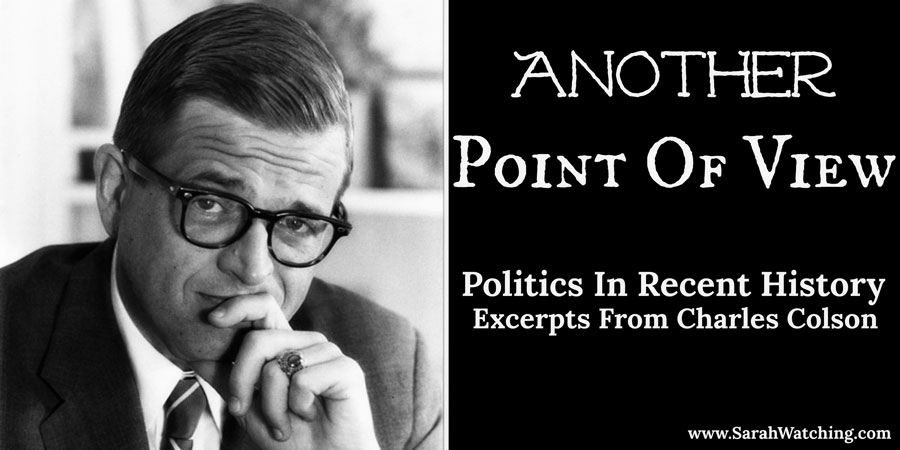Another Point Of View By Charles Colson
Politics In Modern History: The Political Illusion

Read “About Politics In Modern History Posts” If This Is Your First Time To Read A Post In The Series
Politics In Modern History
During this past summer, I have had the pleasure to read some of Charles Colson’s writings, (Colson served as President Nixon’s White House Counsel during the Watergate years, and during his prison sentence he dedicated his life to Christ and eventually founded Prison Fellowship Ministries, PFM.) Colson’s own purposes for writing are similar to Sarah Watching, so there was an immediate connection.
The first Politics In Modern History series comes from Colson’s column Another Point Of View which appeared in PFM’s monthly publication called Jubilee. It is quoted from his book Who Dares To Speak For God? Part of this column was included in the SW article The Economic Political Illusion Of Socialism. It is included here in full.
The Political Illusion By Charles Colson
During an evening newscast, I watched a parade of political candidates promise to end the arms race, eliminate the deficit, settle the Middle East, and produce full employment. It was breathtaking.
Then I tried to remember—and couldn’t—a single instance in which a candidate for any office, from city councilman to president, had ever admitted any problem that he or she could not solve once elected.
But in truth many problems can’t be cured—at least not the way the politicians promise. And even officials in the most powerful offices sometimes discover they’re not so powerful after all.
I remember on Friday afternoon in 1970 when President Nixon called me into his office. “I want an executive order creating a commission to study aid to nonpublic schools,” he snapped. “Have it on my desk by 9 A.M. Monday!” Mr. Nixon was frustrated that the creation of the commission, a campaign pledge, had been ignored by the Justice Department for eighteen months.
Simple enough, I thought. All I had to do was to find the right form, check it out with other staffers, and have it typed. Then belam hit. John Erlichman protested that I was “invading his area.” The attorney general was on the phone, as was the commissioner of education. Memos began flying back and forth as the bureaucracy suddenly came alive.
The battle that began that weekend went on for months. Eventually the order was issued, only to be soon forgotten.
This was no isolated instance. Career bureaucrats outlast presidents, and are experts at stymieing orders they don’t like. Many programs are deadlocked between Congress and the president; some agencies, after being launched with great fanfare, simply watch the problems they were created to solve steadily worsen.
Yet politicians of both parties continue to promise—and the electorate continues to expect—political solutions to all our ills. We go through the same cycle every election year. Why?
Two decades ago, Jacques Ellul, the eminent French historian, answered the question in a remarkably prophetic book, The Political Illusion. Ellul theorized that modern man increasingly turns to the state [that is, government] for answers to his problems—even though the [government] cannot solve them. Politicians perpetuate the myth that it can since the illusion perpetuates their power; the media willingly collaborates since their coverage of government fuels their own power—and profits—as well.
The result, Ellul wrote, is a “boundless growth” of [government], with an insatiable appetite for power. (Of special interest to us in Prison Fellowship’s ministry, Ellul argues that independent groups that involve people in meeting society’s needs are the only way to lessen dependence upon government and its eventual totalitarian control.)
We Christians, of all people, should see through the political illusion. We should understand that the real problems of our society are, at their root, moral and spiritual. Institutions and politicians are limited in what they can do.
Certainly that is so in the criminal justice field. Crime is the result of wrong moral choices. Laws are needed to restrain evil, but penal institutions can’t deal with the ultimate problem: the human heart. That’s why the gospel of Christ is the only real answer.
Even in foreign policy, governments are not all-powerful, as we are accustomed to think. The Marine presence in Lebanon was no deterrent to the centuries-old civil strife there. The British have learned the same lesson in Ulster.
Or take the example of Poland. Against the “powerful” array of Soviet division, thousands of schoolchildren marched with their crucifixes held high, successfully resisting the Communist government’s edict to remove crosses from their classrooms. Where is the real power in Poland? Certainly not in the Politburo.
The political illusion poses two grave dangers. First, as political solutions fail and problems worsen, people become cynical, and in time, alienated from their own political process. The second is that the political illusion fosters a false security: The government is promising to deal with our problems, so we don’t have to bother. It lets us off the hook.
Many of the government’s much bally-hooed programs of the sixties (few of which ever got any money to the needy) offer a case in point. As social programs mushroomed, private agencies helping the poor declined. Because of the illusion that the government was taking care of things, individual people stopped actively caring for others.
So beware of the political illusion. Of course, government is ordained by God to maintain order, promote justice, and restrain sin. But listen with healthy skepticism to inflated political rhetoric. Political institutions provide no panaceas to the ills of our age, no matter how attractive they sound: and they are surely no substitute for individual responsibility.
I’d like to recommend that you read Ellul’s book, The Political Illusion. But I can’t for in the most revealing commentary on our surrender to the illusion the book warns of, it is out of print. No market, the publisher says. -Chuck Colson, June 1984



Comments are Closed